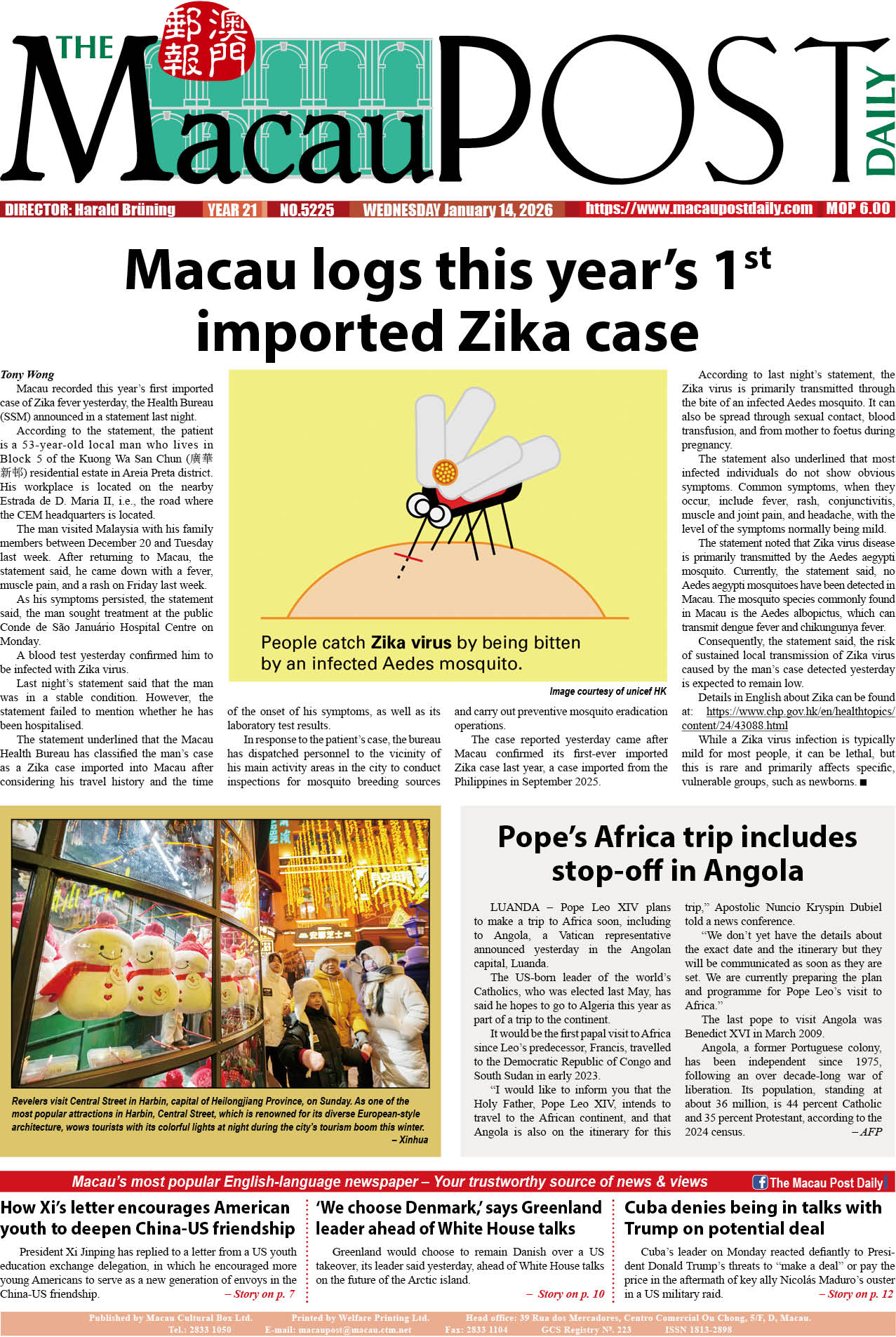Editorial
The latest epidemic statistics indicate that Macau is finally entering the final stretch of vanquishing its monthlong outbreak of the particularly contagious Omicron BA.5.1 outbreak.
As in any race, extra stamina is needed for the final spurt.
As I wrote in my editorial a week ago – just let’s tough it out. And that’s what, according to what I observed last week, almost all of us did.
That’s why the government’s first three phases in its ongoing battle have proved successful. The first phase (June 18-July 3) managed to keep the number of infected people in check while an exponential increase in the number of infections was prevented. The second phase (July 4-10) saw the arrival of 650 healthcare workers from the mainland assisting their local colleagues in tackling the outbreak while the further tightening of control measures resulted in a further drop in new infections per day. In the third phase (initially slated for July 11-18 but now extended through July 22) the government has launched its “relatively static” control measures with the aim of fending off the outbreak’s long-term impact on the city’s socio-economic development and, most importantly, to break the chains of virus transmission in the community as quickly as possible.
The somewhat puzzling term “relatively static” refers to the government’s decision to order the temporary closure of most businesses (including our cash cows aka casinos) and impose restrictions on people’s movements (colloquially known as the “stay-at-home” injunction). Chief Executive Ho Iat Seng has also decreed the mandatory wearing of KN95 facemasks, a very sensible move indeed!
From my personal observation, the great majority of people in Macau have heeded the order.
Thanks to the “relatively static” control measure, the daily number of new cases dropped remarkably, from the outbreak’s peak number of 146 on July 5 to “just” 31 on July 14.
The “relatively static” approach has proved to be an efficacious move that, based on Macau’s specific situation – its extremely high population density, buildings located closely together, residential estates each housing tens of thousands of people, and so on – managed to avoid a citywide lockdown that anyhow would have been virtually impossible to achieve – like herding cats.
We should never forget that Macau has got its “specificities” – as the city’s 135th governor, rear admiral Vasco de Almeida Costa (1932-2010) famously used to say.
That’s why I do agree with the local government that the dynamic zero-COVID policy continues to be in the public interest. Of course, it is a “dynamic” approach, i.e., as the word suggests, it is open to change and adaptation. Even viruses undergo adaptions – by replicating their genes undergo genetic mutations, aka a “copying errors”.
Governments must do everything humanly possible to avoid any errors in their fight against communicable diseases, such as the “sly” Omicron BA.5.1 subvariant, as any policy mistake can lead to zillions of fatalities.
More than two million people have died of COVID-19 in the WHO European Region and over one million in the US. The world’s official death toll stands at nearly 6.4 million.
Woefully, five chronically sick senior citizens have died of complications triggered by the novel coronavirus during Macau’s current outbreak.
However, Macau’s COVID-19 death toll continues to be remarkably low. For instance, Helmstedt, the district where I grew up in Lower Saxony, has a COVID-19 infection rate of nearly 32 percent among its 91,158 residents, and its death toll stood at 144 yesterday. No doubt, something has gone fatally wrong in Europe on the COVID-19 front.
The fight against the novel coronavirus must continue. Inevitably, the ongoing battle will inconvenience all of us and batter the local economy, not only the gaming industry, our number-one money-spinner, but also many other businesses in the short- and perhaps even medium-term. We have just to tough it out so that the government can achieve its goal of protecting residents’ lives and health. The government has pledged another 10 billion patacas to fix the economy and help civil society cope with the COVID-19 fallout.
The anti-COVID-19 struggle does require the participation and cooperation of all of us. Those who don’t cooperate need to be sternly punished as a deterrence to others, based on the age-old Chinese adage: kill the chicken to scare the monkey (殺雞儆猴), by making an example out of someone in order to threaten others.
Talking about animals, I can’t help it but I need to mention the somewhat Kafkaesque row over the government’s ban on dog owners taking their pooches for a walk under the current COVID-19 control measures.
I do like dogs, Japan’s Shiba Inu and Siberian huskies in particular. I owned an Alsatian when I lived in Hong Kong’s then still rather pastoral New Territories in the early 1980s. But because I do like dogs, I never owned one in Macau because I believe that the city’s ultra-urban environment is not suitable for man’s best friend (Coloane being the exception that confirms the rule). That’s why in Macau I have limited my preference for pets to ornamental fish, both at home and in the office. Previously, I also kept some terrapins. I admit that it all has also something to do with “feng shui” – Chinese geomancy.
Local colleagues of mine have told me that they would like to own a dog but that they wouldn’t be able to afford veterinary clinics’ fees.
Friends told me that their beloved dogs are missing their regular walkies, and as their pets are trained to relieve themselves outdoors they find it difficult to defecate and urinate at home.
The “dog poop” controversy took up considerable time of the daily press conferences by the Novel Coronavirus Response and Coordination Centre last week – to such a degree that a local Chinese-language media colleague asked me why some journalists seemed to be more worried about the fate of canines than humans during the current outbreak.
I suggest that Macau’s dog owners and veterinarians join hands in ensuring that dogs get their proper care during this special control period which, after all, is first of all an emergency measure intended to keep us humans safe.
Perhaps, Macau’s veterinarians could set up an ad hoc group that would be on call 24/7 for pet owners requiring urgent assistance for their animals. One should not always just blame the government for everything that inconveniences us right now. Civil society – including animal lovers – should get ready to help out as well.
Looking further ahead, it’s obvious that only when the government has achieved its dynamic zero-COVID goal can the cross-border flow of people between Macau and the mainland return to its pre-pandemic situation. Mainlanders accounted for some 70 percent of our visitors before the pandemic, a figure which has topped 90 percent since 2021. Visitors from the mainland have been our tourism industry’s lifeblood for two decades – a situation that can be expected to continue in the post-pandemic era. That’s absolutely normal since mainlanders are our compatriots and neighbours.
I hope that the next phase in vanquishing the current outbreak – the so-called “consolidation period” – will enable all of us to return to a pre-pandemic life. But both our government and civil society must remain on high alert for a possible resurgence of whatever nasty subvariant of COVID-19 by keeping a close eye on people who are particularly vulnerable to novel coronavirus infection such as the elderly, immunocompromised and the chronically sick. Even the smallest outbreak must be nipped in the bud.
And the medical profession must also pay close attention to the possible effects of long COVID, a condition characterised by long-term consequences persisting or appearing after the typical convalescence period of COVID-19. According to a study published by the University of Michigan in April 2022, nearly half of people infected with COVID-19 experienced some long COVID symptoms, such as fatigue and memory problems.
I am optimistic that with the help of the central government Macau will finally be able to keep the nasty virus at bay. But that requires the full-hearted commitment by everyone in Macau – including our dog owners still insisting on taking their pets for a walk and smokers who stubbornly disobey the government’s mandatory wearing of a facemask in public places.
As US football coach Lou Holtz rightly said: Without self-discipline, success is impossible, period!
– Harald Brüning







